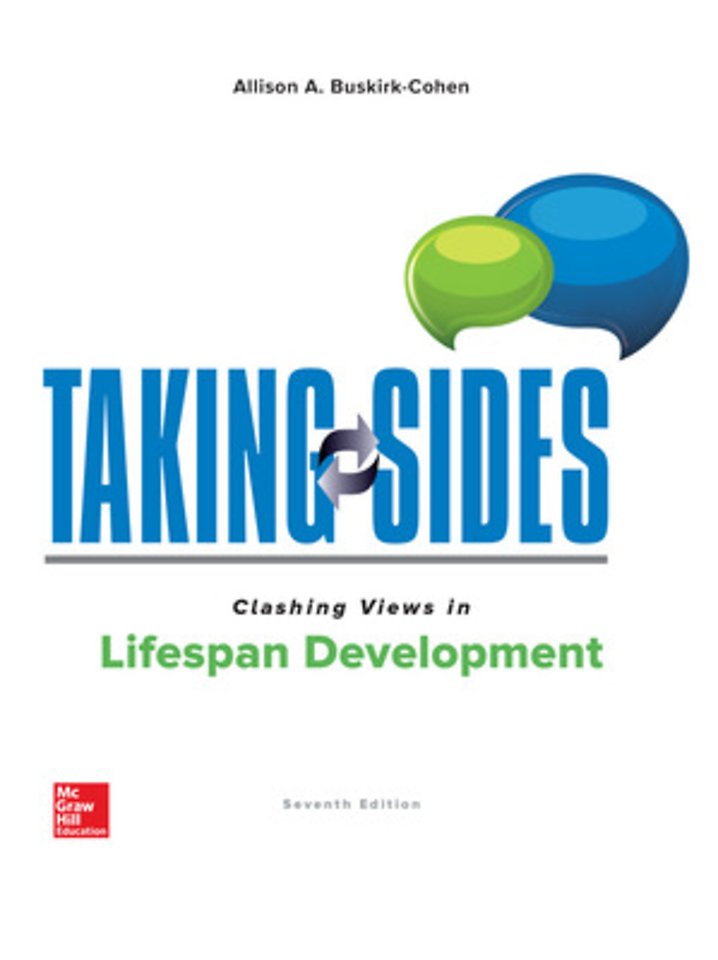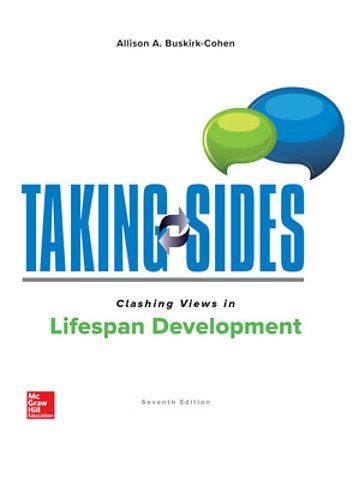Taking Sides: Clashing Views in Lifespan Development
Samenvatting
The Taking Sides Collection on McGraw-Hill Create® includes current controversial issues in a debate-style forma designed to stimulate student interest and develop critical thinking skills. This Collection contains a multitude of current and classic issues to enhance and customize your course. You can browse the entire Taking Sides Collection on Create or you can search by topic, author, or keywords. Each Taking Sides issue is thoughtfully framed with Learning Outcomes, an Issue Summary, an Introduction, and an "Exploring the Issue" section featuring Critical Thinking and Reflection, Is There Common Ground?, Additional Resources, and Internet References. Go to the Taking Sides Collection on McGraw-Hill Create® at www.mcgrawhillcreate.com/takingsides and click on "Explore this Collection" to browse the entire Collection. Select individual Taking Sides issues to enhance your course, or access and select the entire Buskirk-Cohen: Taking Sides: Clashing Views in Lifespan Development, 7/e book for here http://create.mheducation.com/createonline/index.html#qlink=search%2Ftext%3Disbn:1260494179 an easy, pre-built teaching resource. Visit http://create.mheducation.com for more information on other McGraw-Hill titles and special collections.
Specificaties
Inhoudsopgave
or College Students?</u><br/>YES: Devon M. Alvarez, from "Death by Hazing: Should there be a Federal Law Against Fraternity and Sorority Hazing?" Journal of Multidisciplinary Research (2015)<br/>NO: Olga Khazan, from “The Bro Whisperer,” The Atlantic (2015)<br/><br><br/>Devon Alvarez provides an overview of hazing in sororities and fraternities and reviews the current laws on hazing in the United States. Alvarez finds that anti-hazing legislation varies from state to state both in terms of definitions and consequences. Therefore, the proposed solution includes federal anti-hazing legislation. On the other hand, Olga Khazan follows the work of sociology professor Michael Kimmel who argues the problem is our definition of masculinity, not Greek life. This article describes Kimmel’s work to change power dynamics around sexual behaviors. Several potential solutions are explored, all with the focus on reviving the concept of the gentleman.<br/><br><br/><u>Issue: Is a College Degree Valuable?</u><br/>YES: Jennifer Ma, Matea Pender, and Meredith Welch, from "Education Pays 2016: The Benefits of Higher Education for Individuals and Society—Trends in Higher Education Series," The College Board (2016)<br/>NO: Cristina C. López, from "Measuring College Value," Journal of Multidisciplinary Research (2018)<br/><br><br/>Jennifer Ma and colleagues describe differences in earnings and employment patters of adults with different levels of education in the United States. They find that college education increases the likelihood of moving up the socioeconomic ladder and is associated with healthier lifestyles. Do these findings hold true for all individuals? Cristina López reviews the literature on the value of obtaining a college degree, focusing on minority first-generation college students with low socioeconomic status and a lack of role models at home. She finds that these students are at risk for retention, program completion, and access to rewarding careers.<br/><br><br/><u>Issue: Is Facebook Bad for College Students' Health?</u><br/>YES: Holly B. Shakya and Nicholas A. Christakis, from "Association of Facebook Use With Compromised Well-Being: A Longitudinal Study," American Journal of Epidemiology (2017)<br/>NO: Peter Jegrace Jehopio, Ronald Wesonga, and Douglas Andabati Candia, from "Effect of Online Social Networking Sites Usage on Academic Performance of University Students in Uganda," International Journal of Computer Applications (2017)<br/><br><br/>Young adults commonly use social networking sites. Are their negative consequences for that use to our psychological health? Holly Shakya and Nicholas Christakis evaluated the associations of Facebook activity and real-world social network activity with several measures of well-being. Overall, their results demonstrate that use of Facebook is negatively associated with well-being. In a study looking specifically at the academic context, Peter Jehopio and colleagues investigated whether the use of online social networking sites improves academic performance. They found that students who managed their time well and who used online social networking sites for academic purposes were more likely to perform better academically.<br/><br><br/>Unit 5: Middle Adulthood<br/><br><br/><u>Issue: Do Adults Need to Place More Value on Marriage?</u><br/>YES: Lawrence Aber, et al., from “Opportunity, Responsibility, and Security: A Consensus Plan for Reducing Poverty and Restoring the American Dream,” American Enterprise Institute (2015)<br/>NO: Brenda McKerson, from "Raising the Next Generation: What's Gender Got to Do with It?" Plaza: Dialogues in Language and Literature (2014)<br/><br><br/>In this policy report, members of the Brookings Working Group argue marriage offers significant benefits, particularly for children. They recommend promoting new cultural norms for parenthood and marriage, providing young adults with education on family planning and effective parenting, and helping to engage young men in work and family. In contrast, Brenda McKerson argues that research on “non-traditional” couples often reflects heterosexist norms. She draws parallels between racial discrimination in the 1960’s and discrimination faced by same-sex couples today. Furthermore, McKerson believes that as generations become more accepting of different family structures, research findings will change to reflect this acceptance.<br/><br><br/><u>Issue: Should Grandparents Have Visitation Rights to Their Grandchildren?</u><br/>YES: Lixia Qu et al., from "Grandparenting and the 2006 Family Law Reforms," Family Matters (2011)<br/>NO: Rachel Dunifon and Ashish Bajracharya, from "The Role of Grandparents in the Lives of Youth," Journal of Family Issues (2012)<br/><br><br/>Lixia Qu and colleagues review Australian data on grandparent-grandchild involvement before and after the 2006 legal reforms. They find that that family law reforms are consistent with parental beliefs about grandparent involvement. However, they caution that the reforms do not address many practicalities, including knowledge about the legal system. However, the research of Rachel Dunifon and Ashish Bajracharya, does not find clear evidence that grandparents influence the well-being of their grandchildren. They find that distance, the parent’s relationship with the grandparent and child, and age of child and parent all contribute to the quality of the grandparent-grandchild relationship.<br/><br><br/><u>Issue: Are Pap Smears Unnecessary for Women over Age 65?</u><br/>YES: Diana R. Curran and Sue Stigleman, from “Should We Discontinue Pap Smear Screening in Women Aged >65 Years?” The Journal of Family Practice (2004)<br/>NO: Ayasha P. Thomason, et al., from "Discontinuation of Pap Smears at Age 65: A Critical Analysis of the Impact on Women’s Health," Journal of Women’s Health Care (2015)<br/><br><br/>Dianna Curran and Sue Stigleman review 12 studies from 1995 to 2001, which included women aged 50 years and older. They found that few older women with a history of baseline Pap smear will develop cervical cancer. They also summarize recommendations from other and provide a clinical commentary. However, Ayasha Thomason and colleagues analyze how changing guidelines for screenings will influence healthcare practice, particularly for women over age 65. They conclude that there is great potential for women to develop later stage diagnoses of cancers, pelvic organ issues, incontinence, and infections.<br/><br><br/>Unit 6: Late Adulthood<br/><br><br/><u>Issue: Should Assisted Suicide Be Legal for Everyone?</u><br/>YES: April Dembosky, from “Doctors’ Secret Language for Assisted Suicide,” The Atlantic (2015)<br/>NO: Ira Byock, from “Physician-assisted Suicide Is Not Progressive,” The Atlantic (2012)<br/><br><br/>“Assisted suicide,” or euthanasia, has become a more familiar phrase with sick, aging adults looking for personal control during this last part of life. April Dembosky argues that because many state laws prohibit euthanasia, medical professionals cannot converse properly with their patients about end-of-life decisions. Legalizing assisted suicide across the nation would allow for better communication, the article posits. Ira Byock, in contrast, believes that physician-assisted suicide should not be legal. In this article, he describes the political climate influencing the euthanasia debate. Furthermore, Byock claims that the focus should be on improving end-of-life care.<br/><br><br/><u>Issue: Should We Try to "Cure" Old Age?</u><br/>YES: Guillermo Abril, from “Could Science One Day Cure Us of Old Age?” World Economic Forum (2017)<br/>NO: Ezekiel J. Emanuel, from "Why I Hope to Die at 75," The Atlantic (2014)<br/><br><br/>Guillermo Abril describes the work of scientists who are developing stem cell therapies, investigating microscopic DNA structures, and exploring other anti-aging possibilities. These individuals believe we can combat age-related diseases and illness, thereby extending the lifespan. Ezekiel Emanuel, an oncologist and bioethicist, presents a contrasting view. He argues against an ever-expanding lifespan. Instead, his believes this article suggest our focus should be on maximizing our quality of life and accepting the inevitability of death.<br/><br><br/>
Net verschenen
Rubrieken
- aanbestedingsrecht
- aansprakelijkheids- en verzekeringsrecht
- accountancy
- algemeen juridisch
- arbeidsrecht
- bank- en effectenrecht
- bestuursrecht
- bouwrecht
- burgerlijk recht en procesrecht
- europees-internationaal recht
- fiscaal recht
- gezondheidsrecht
- insolventierecht
- intellectuele eigendom en ict-recht
- management
- mens en maatschappij
- milieu- en omgevingsrecht
- notarieel recht
- ondernemingsrecht
- pensioenrecht
- personen- en familierecht
- sociale zekerheidsrecht
- staatsrecht
- strafrecht en criminologie
- vastgoed- en huurrecht
- vreemdelingenrecht

